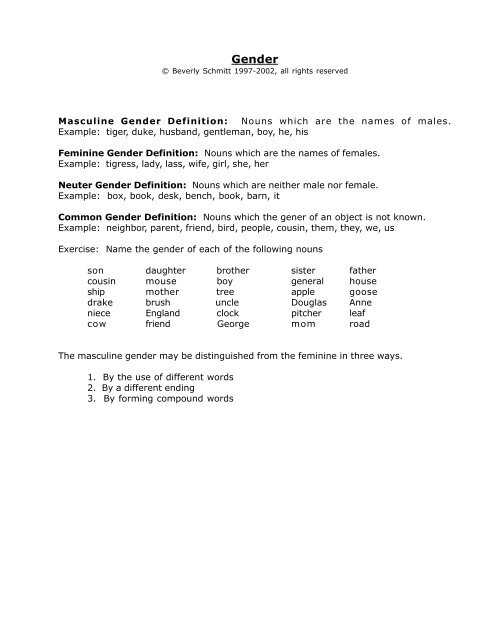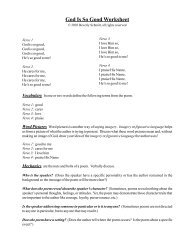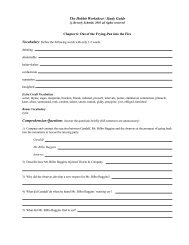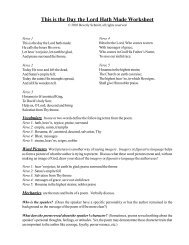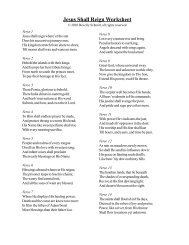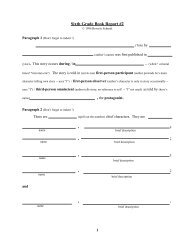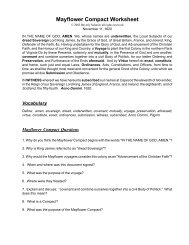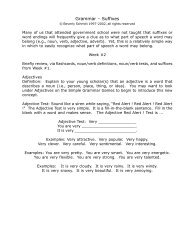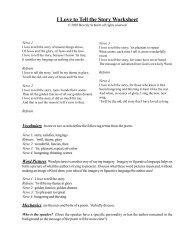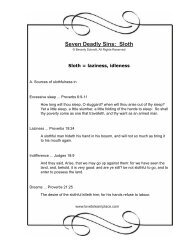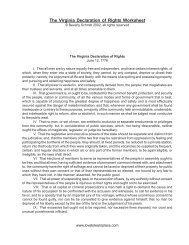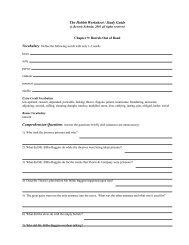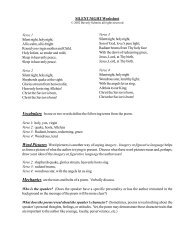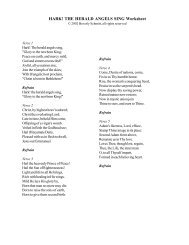You also want an ePaper? Increase the reach of your titles
YUMPU automatically turns print PDFs into web optimized ePapers that Google loves.
<strong>Gender</strong><br />
© Beverly Schmitt 1997-2002, all rights reserved<br />
Masculine <strong>Gender</strong> Definition: Nouns which are the names of males.<br />
Example: tiger, duke, husband, gentleman, boy, he, his<br />
Feminine <strong>Gender</strong> Definition: Nouns which are the names of females.<br />
Example: tigress, lady, lass, wife, girl, she, her<br />
Neuter <strong>Gender</strong> Definition: Nouns which are neither male nor female.<br />
Example: box, book, desk, bench, book, barn, it<br />
Common <strong>Gender</strong> Definition: Nouns which the gener of an object is not known.<br />
Example: neighbor, parent, friend, bird, people, cousin, them, they, we, us<br />
Exercise: Name the gender of each of the following nouns<br />
son daughter brother sister father<br />
cousin mouse boy general house<br />
ship mother tree apple goose<br />
drake brush uncle Douglas Anne<br />
niece England clock pitcher leaf<br />
cow friend George mom road<br />
The masculine gender may be distinguished from the feminine in three ways.<br />
1. By the use of different words<br />
2. By a different ending<br />
3. By forming compound words
The masculine gender may be distinguished from the feminine in three ways.<br />
1. By the use of different words<br />
Masculine Feminine Masculine Feminine<br />
bachelor maid / spinster beau belle<br />
boy girl brother sister<br />
cock/rooster hen drake duck<br />
father mother gander goose<br />
gentleman lady hart roe<br />
husband wife king queen<br />
lord lady lad lass<br />
male female man woman<br />
Mr. Mrs. nephew niece<br />
papa mama sir madam<br />
son daughter stag hind<br />
uncle aunt<br />
2. By a different ending<br />
Masculine Feminine Masculine Feminine<br />
abbot abbess ac<strong>to</strong>r actress<br />
benefac<strong>to</strong>r benefactress bridegroom bride<br />
count/earl countess czar czarina<br />
don doña duke duchess<br />
emperor empress friar / monk nun<br />
giant giantess God goddess<br />
heir heiress host hostess<br />
lion lioness marquis marchioness<br />
peer peeress prince princess<br />
prior prioress shepherd shepherdess<br />
songster songstress sultan sultana<br />
tailor tailoress tiger tigress<br />
viscount viscountess widower widow<br />
wizard witch administra<strong>to</strong>r administratrix<br />
execu<strong>to</strong>r executrix prosecu<strong>to</strong>r prosecutrix<br />
testa<strong>to</strong>r testatrix hero heroine<br />
equestrian equestrienne<br />
3. By forming compound words<br />
Masculine Feminine Masculine Feminine<br />
gentleman gentlewoman grandfather grandmother<br />
he-goat she-goat landlord landlady<br />
man-servant maid-servant peacock peahen<br />
schoolmaster schoolmistress stepfather stepmother<br />
© Beverly Schmitt 1997-2002, all rights reserved
Flashcards<br />
Cut on solid lines and fold on the dotted lines.<br />
Front Back<br />
Masculine <strong>Gender</strong><br />
Definition<br />
© Beverly Schmitt 1997-2002, all rights reserved<br />
Feminine <strong>Gender</strong><br />
Definition<br />
© Beverly Schmitt 1997-2002, all rights reserved<br />
Neuter <strong>Gender</strong><br />
Definition<br />
© Beverly Schmitt 1997-2002, all rights reserved<br />
Common <strong>Gender</strong><br />
Definition<br />
© Beverly Schmitt 1997-2002, all rights reserved<br />
© Beverly Schmitt 1997-2002, all rights reserved<br />
Nouns which are the names of<br />
males.<br />
Ex: tiger, duke, husband,<br />
gentleman, boy, he, his<br />
Nouns which are the names of<br />
females.<br />
Ex: tigress, lady, lass, wife, girl, she,<br />
her<br />
Nouns which are neither male nor<br />
female.<br />
Ex: box, book, desk, bench, book,<br />
barn, it<br />
Nouns which the gender of an object<br />
is not known.<br />
Ex: neighbor, parent, friend, bird,<br />
people, cousin, them, they, we, us
Flashcards<br />
Cut on solid lines and fold on the dotted lines.<br />
Front Back<br />
How many ways may<br />
the masculine gender<br />
be distinguished from<br />
the feminine?<br />
© Beverly Schmitt 1997-2002, all rights reserved<br />
Give an example of<br />
using different words <strong>to</strong><br />
distinguish masculine<br />
from feminine gender.<br />
© Beverly Schmitt 1997-2002, all rights reserved<br />
Give an example of using<br />
different ending <strong>to</strong><br />
distinguish masculine<br />
from feminine gender.<br />
© Beverly Schmitt 1997-2002, all rights reserved<br />
Give an example of<br />
forming compound words<br />
<strong>to</strong> distinguish masculine<br />
from feminine gender.<br />
© Beverly Schmitt 1997-2002, all rights reserved<br />
three<br />
© Beverly Schmitt 1997-2002, all rights reserved<br />
1. use of different words<br />
2. different ending<br />
3. forming compound words<br />
beau, belle; gander, goose<br />
king, queen; lad, lass<br />
brother, sister; husband, wife<br />
lord, lady; male, female<br />
emperor, empress; heir, heiress<br />
ac<strong>to</strong>r, actress; lion, lioness<br />
prince, princess; tiger, tigress<br />
shepherd, shepherdess;<br />
widower, widow; hero, heroine<br />
gentleman, gentlewoman<br />
grandfather, grandmother<br />
landlord, landlady<br />
peacock, peahen<br />
schoolmaster, schoolmistress


